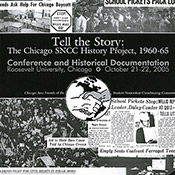Chicago SNCC History Project Archives
Finding Aid: Chicago SNCC History Project Archives
Repository:
Chicago Public Library, Carter G. Woodson Regional Library, Vivian G. Harsh Research Collection of Afro-American History and Literature
 Chicago SNCC History Project ArchivesThe Chicago Area Friends of SNCC (CAFSNCC) was
founded in January of 1963 by a small group of Chicago activists
interested in supporting and lending financial assistance to SNCC’s work
in the South through fundraising, clothing and food drives, and
recruitment. Similar to other “Friends of SNCC” groups which
operated mainly in the northern and western part of the United States,
CAFSNCC held close ties with the Southern movement. The CAFSNCC also
involved itself in many local Chicago civil rights struggles such as
adequate and fair employment, education and housing for African
Americans in the city and played an important role in the 1963 Chicago
Schools Boycott. As part of Freedom Day activities, the CAFSNCC
organized Freedom Schools for children to attend where they could learn
about the history of African American freedom struggles. Autonomous in
structure, the Chicago Area Friends of SNCC, unlike SNCC, was membership
based. The CAFSNCC ended in 1968 with the collapse of SNCC at the
national level.
Chicago SNCC History Project ArchivesThe Chicago Area Friends of SNCC (CAFSNCC) was
founded in January of 1963 by a small group of Chicago activists
interested in supporting and lending financial assistance to SNCC’s work
in the South through fundraising, clothing and food drives, and
recruitment. Similar to other “Friends of SNCC” groups which
operated mainly in the northern and western part of the United States,
CAFSNCC held close ties with the Southern movement. The CAFSNCC also
involved itself in many local Chicago civil rights struggles such as
adequate and fair employment, education and housing for African
Americans in the city and played an important role in the 1963 Chicago
Schools Boycott. As part of Freedom Day activities, the CAFSNCC
organized Freedom Schools for children to attend where they could learn
about the history of African American freedom struggles. Autonomous in
structure, the Chicago Area Friends of SNCC, unlike SNCC, was membership
based. The CAFSNCC ended in 1968 with the collapse of SNCC at the
national level.
The Chicago SNCC History Project Archives contains the papers of the CAFSNCC, SNCC—National, and the Chicago SNCC History Project. The CAFSNCC records include correspondence, manuscripts, administrative and financial and legal papers related to the group’s activities. Also included are records and clippings of the 1963 Chicago Schools Boycott as well as materials from other Chicago-based civil rights organizations like the Coordinating Council of Community Organizations (CCCO), the Chicago Urban League, the Negro American Labor Council (NALC) and the Tenants Committee for Better Education of Robert Taylor Homes. The SNCC-National records contain administrative records and correspondence from the national headquarters in Atlanta, GA as well as communications from various other SNCC organizing projects across the country. Also represented are manuscripts either authored by or featuring SNCC, an incomplete run of the SNCC’s publication, The Student Voice, and photographs. The final series documents the Chicago SNCC oral history project, including records from the 2005 Tell the Story Conference and interviews and interview transcripts from oral histories with former CAFSNCC members and SNCC staff.





